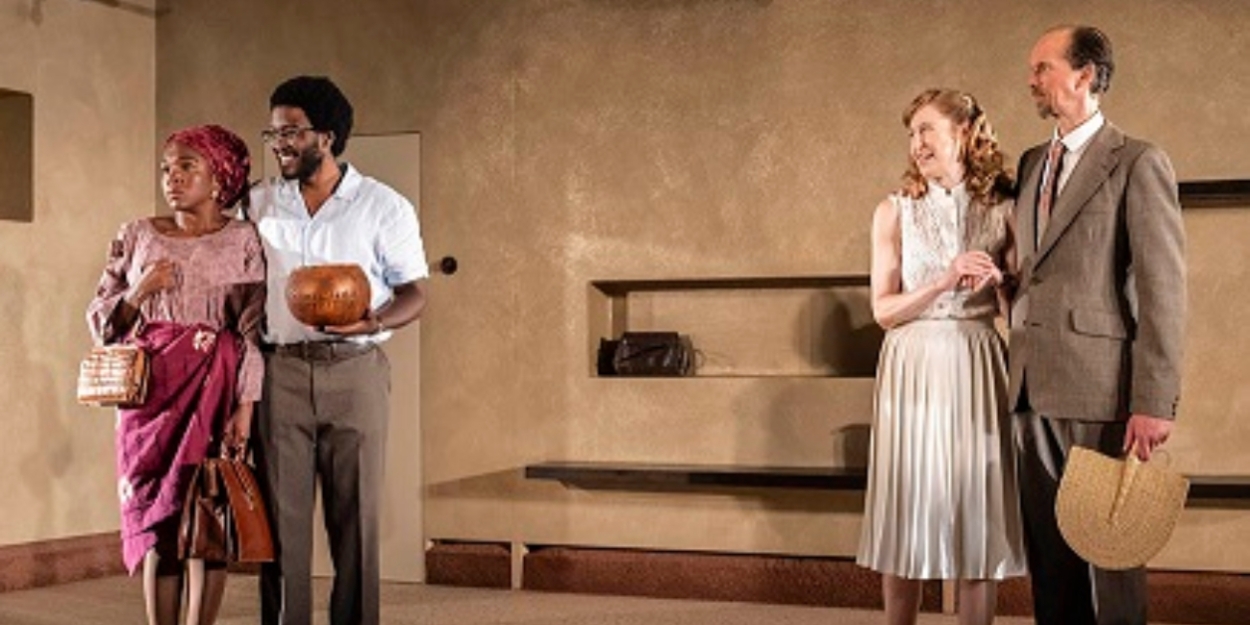Review: BENEATHA'S PLACE, Young Vic
Kwame Kwei-Armah brings back his sequel to A Raisin in the Sun in a lecture on privilege and prejudice that isn't quite as cohesive as it thinks it is.

![]() When Beneatha leaves Chicago to follow her husband Joseph to Lagos at the end of Lorraine Hansberry’s classic A Raisin in the Sun, her future is left unwritten.
When Beneatha leaves Chicago to follow her husband Joseph to Lagos at the end of Lorraine Hansberry’s classic A Raisin in the Sun, her future is left unwritten.
Enter Kwame Kwei-Armah, who picks up the story and follows the character as she moves to a white suburb in Nigeria before going back to the States. If the first act of Beneatha’s Place is an immediate sequel to A Raisin in the Sun, the second is the sequel to the sequel. The project gets a lot right, but there’s a deep disconnect in the middle that sits next to the overly didactic angle of the events that unfold.
Part one is crammed with information and facts that ride on each other’s back at rollicking speed. The historical context is essential to the reception of the play, so Kwei-Armah explains it plainly in his dialogue. Everything that happens is a set-up to cover certain issues. From the mention of insurrections and riots in the country to the brutality of the British regime via the overt government conspiracies, it’s as if the writer had a checklist. This continues in the second act.
Sixty years later, Beneatha is the Dean of an unnamed Ivy League college. She’s taken the curriculum committee to her old house in Lagos to discuss the role of African American studies. Kwei-Armah crafts the perfect opportunity to engage in a conversation on race as debates break over their potential substitution with a major on “critical whiteness”. Her colleagues’ covert racism is immediately observable. They come for each other’s intellectual throats to tackle every side of the argument, ticking away all the boxes.
Written a decade ago, the piece is perhaps more significant now than it was in 2013. Beneatha’s Place is unquestionably and ideologically hefty, academically relevant, and socio-politically topical. It very much rides on the coattails of Raisin, covering the same points with an added first-hand representation of the political climate of pre-independent Nigeria and an academic look at the current societal dynamics. It’s an explicit lecture on privilege and prejudice.
The characters, however, could be anyone and the plot easily belongs to two different plays. While faults can be nitpicked from start to end, it’s indisputable that Kwei-Armah has assembled an astonishing cast. Cherrelle Skeete goes from a bold young wife to an ageing, self-assured career woman who paved the way for generations to come. She is supported and buffed by Zackary Momoh as her husband and then as Wale, the only other non-Caucasian member of the university board.
Skeete reiterates her status as a theatrical powerhouse, introducing a woman of gentle confidence with an iron will. Quick and witty, she finds perfect foil in Momoh’s passionate portrayal and poised reactionary ideals. When the two reconvene after the interval, Skeete meets the same encouragement in his scholar. They stand against three white actors who portray an opposition of sorts.
Sebastian Armesto goes from an undercover CIA agent with a disquieting air to the unnerving director of African American Studies who makes a statement with his whiteness. His meek but ominous presence as Daniel gives way to Mark’s academic pomp and verbose arguments in a swift shift in performance. Tom Godwin and Nia Gwynne welcome the newlyweds to their former home in the opening with patronising offence and immediately turn into a cautionary tale about racism. When the lights go back up, they’re senior members of the university committee who battle to change the major to “Critical Whiteness”. Once again, they become pawns in Kwei-Armah’s game of polite awakening.
Convention wants that a comic relief is included, so Jumoké Fashola is Beneatha’s auntie. Sassy and gossipy, she’s a breeze into the aggressively purposeful plot. Debbie Duru’s set changes minimally over the timeline. The couple brings in Joseph’s memorabilia at the start, mammy knick-knacks and other sentimental objects of questionable nature, leaving their imprint on the blank slate that was the Nelsons’ house. Dust sheets cover everything up in the second act, cracks appear in the walls, and clay covers the floors. It’s a run-down no-man's-land.
Read our interview with Cherrelle Skeete here.
Beneatha’s Place runs at the Young Vic until 5 August
Photo Credit: Johan Persson
Reader Reviews

Videos

